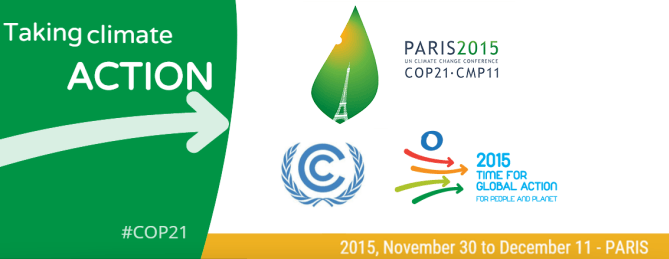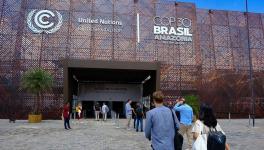Need Delivery in Climate Talks, not Mere Announcements - D. Raghunandan
Newsclick interviewed D. Raghunandan, member of Delhi Science Forum, on the Paris Conference on climate change. Raghunandan said, the reality is that there is no major change happened on the ground though there is some progress in the meetings. The United States, having been escapist in its commitments till now, has shown some positive response. This is one of the major development in Paris. He argues, the developed countries cannot be excluded from the pledges as they were the large polluters so far and still contribute the major emissions in coal and thermal energies. India and China, being the major emitters in the world, now cannot escape the future reductions anyway. As far as the technical and financial modalities of renewable resource is concerned, Raghunandan, unlike the so-called development advocates, believes that it is not a viable option compare to the fossil fuels.

Image Courtesy: un.org/climatechange
Rough Transcript:
Rishab Bailey - Welcome to Newsclick. Given the series of enormous weather revenge we have seen over last few years, the narrative regarding climate change has definitely changed in the main stream media. This is shown by the coverage of the Paris climate change conference that is currently under way. This important conference has the other difficult objective of negotiating a legally binding a universal agreement on climate change, which is set to involve all the nations in the world. Broadly speaking, the aim is to ensure that the emission levels of green house gases are caps so as to keep global temperatures within two degrees above the pre-industrial level. We are joining by Raghu, who is associated with All India People's Science Network and Delhi Science Forum, to discuss the importance of the Paris meeting and particularly to discuss what it would mean for developing countries like India.
Now, could you give us a little background regarding the previous climate change meeting we have seen, for instance the Copenhagen meeting, last big, which one is in 2009 ended in failure. So why should this Paris meeting any different?
D.Raghunandan - Well, let me begin by saying that, although Copenhagen ended as failure, in the sense that there was target set at Bali conference, that a solution will be delivered at Copenhagen. A solution did not come from Copenhagen. In that sense, it is a failure in view of what is transpired since then, you can see as Copenhagen sets the foundation for what is to come in Paris. There was a decisive shift in Copenhagen away from the framework that has governed the architecture of international climate change, emission control agreements. From the Kyoto protocol, which advocated a firewall between developing and developed countries, which was virtually dismantled at Copenhagen. And in Copenhagen, it was agreed that, all countries would do something to tackle the problem of climate change. So while there was no formal agreement at Copenhagen, these major principles in place of earlier Kyoto principle were agreed upon Copenhagen, even though informally and that is what continued and is expected to form the foundation of an agreement in Paris. Now why do we expect Paris to be any different? Since Copenhagen, there were many meetings, each of them have taken a step forward in slowly, gradually cementing this new framework for a global emission control architecture and there is now growing momentum to get an agreement among the public in different countries, who have put pressure on their governments and last but not least, the United States which is refused to come on board because it is objected to a firewall, which would place obligations on itself and developed countries, but not on China and India is now happier with a single framework which it has been pressing for and which now likely to be adopted in Paris.
RB - Now as you referred to, I mean these climate change meetings in the past have always been split on the issue of who should ultimately bare the cost or bare the larger share of the cost in shifting from our present fossil fuel based energy systems and whether it is fair for developing countries the share to shoulder an equitable burden given historical and economical realities. Now this will always be continue to an issue. What is actually changed in the thinking particularly in the developing nations, that will allow a negotiated outcome in Paris. Could you tell what specific things that actually have happened?
DR - And when you say cost, are you talking money cost or you are talking emission reduction as a cost?
RB - Both. and the cost it could have on your economy generally.
DR - I think the first thing is, starting again from Copenhagen onwards. There was a recognition among large developing countries, the so called major economies or emerging economies; China, India, Brazil, Argentina, countries like that. India is today, the world's third largest emitter. China is the largest emitter. So there is an understanding which is increasingly crystallising since Copenhagen that, these countries can no longer take the position that, we will do nothing. While it was correct for India and China to maintain that, the problem is because by the developed nations, the idea that developing countries including large ones like China and India need not do anything. I think this is now recognised that this is an old position which would have been justified in the early 90s when these negotiations first began but it is no longer justifiable in the middle second decade of this millennium, given the size of the economy, given the size of emissions. However how emission can be reduced in these large countries is an another matter and clearly that is the difference between how it will reduce the emissions and how this developed nations would reduce their emission. So there is good reason and justification for developing countries, particularly large ones like China and India to take on some of the burden of the reducing emissions. However, what is happening now and I am sure we will discuss this in more detail later. What is happening now is that, the share of this burden which we have agreed should be taken up by the large developing countries as well. They are over the years more and more of the shares has been thrust on them by the developed countries particularly by the EU. Largely because they themselves has announced or declared or are unwilling to take on a larger share. Thereby leaving you to take on problem because the US in particular has created a narrative around that, if climate change is going on now, then it is you who are more responsible, leading India and China and the developed countries, going by current pollution.
RB - So what exactly the India's position at this Paris talks and given our massive energy requirements? I mean Modi is spoken, how we are going to use more coal and so and so far. How will the commitments made in Paris actually hamper or will it hamper our development trajectory at all?
DR - See, India as you know, has announced it's what is called INDC(Indented Nationally Determined Contributions). The contribution to the global emission reduction effort and these are voluntary pledges and this is what going to be discussed at Paris. All countries today are placing voluntary emission reduction pledges rather than the earlier Kyoto framework of, you know what you want to achieve and you divided up burden among the different countries and set quotas. The US being dead set against targets of quotas, propose this methodology now come to the virtually universally accepted. There is question about which is more effective and which is more pragmatic. Clearly a top-down target is more realistic in terms of the goal you have set and in terms of science. You know that the atmosphere can take only so much carbon. If you want to stay within 2 degree temperature raise, which is the openly set international goal, if that is the case, then keeping that in mind, target should set, which now with pledge and review system or bottom-up system, you have got all these pledges but they don't adapt the 2 degree Celsius. So what you have got today is a set of voluntary pledges which actually will lead to a temperature raise of more than 3 degrees.
RB - And assuming that the voluntary pledges are actually adhered to.
DR - So therefore, in terms of effectivity and science, this is clearly not an adequate system. But because the US would not accept the other framework because the developed countries also joined US and saying we also want a framework which places a greater share of the burden on China, India and others. This pledge and review system is taken to be a more pragmatic approach, where you can be more assured of some success, if you define the success as getting an agreement. And if you don't define success as agreement which needs the requirement of science.
RB - Now, is it feasible for third world countries to win themselves? I mean in short term, at least of the dependants on fossil fuels which as you pointed out, you know everyone says, that is the main reason why you have such high emission in developing countries. So are renewable energy sources actually affordable and accessible enough to be use on larger scale? We know that Modi for instance now called upon Sun receiving countries to join together and work on solar energy for instance.
DR - There is a two part answer to this. One part of which stems from your previous question, which is to what extend can developing countries can take the burden of these emission pledges that we have been asked to met. Now, India has made a pledge, which to my mind is moderate in terms of what is achievable but at the same time, we must realise that, there is a finite amount of carbon that the atmosphere can take. The IPCC's 5th report has said that, since the dawn of the industrial era, all countries of the world put together have emitted about 3000 Billion tons of carbon dioxide equivalent into the atmosphere. 2000 gigatonnes or billion tonnes have already gone-in. Of which, 75% has been put there by the US and other developed countries. That leaves you with what is known as carbon budget of 1000 gigatonnes, that is what left. All these pledges put together now amount to be about 750 billion tonnes or gigatonnes, that means after 2030, which is when these pledges are tagged towards, there is only 250 gigatonnes left for all the countries of the world. Now that means, there is a huge constraint being put on developing countries like India, whose per capita energy consumption and emission are still 1/3 of the global average and less than 10th of US average. We are being constrained to develop, to lift our population our of poverty, to raise their living standards but all by doing, a very low carbon pathway. How affordable is this and how realistic is this. One is as Prime Minister has said, as China is doing is our reliance on coal, at least for the medium term to 2030 or 2035. Now although US has successfully managed to paint India as the big villain in this coal usage, in terms of total percentage of our electricity generation, are all not that bad. United States has comparable numbers of 40% of all power coming from coal and thermal sources. So is Germany, So is the United Kingdom have a high coal percentage. So we are not alone in that. And part of this is not just with cost. It is to do with what resources you have. The US has oil, we don't have oil. You have got the Sun. Now one is resources, the other is solar energy today or other renewable sources fluctuate in terms of their production of electricity. Solar for example, you can't generate at night and you have not yet technologically built-up the capacity to store the electricity because enormous batteries are required, not commercially viable today. That is one part of the story, which means you get less with coal or any other thermal source, you get continuous power generation through out the day. The second aspect of it is the fluctuations. Wind for example, you get more in the evening, you get less in the afternoon, you will get more in the early morning if you are nearby the coast. They are not consistent, they fluctuate and also make distribution and transmission more problematic. So there are both technical and financial restrictions. Financially also there is a lot of talk about solar energy cots have been dropped very very low close to commercial energy from coal, actually that is not true. Because installed capacity which is what Prime Minister Modi has been talking about till now, does not translate into delivered electricity. I can have a 100 Megawatts of installed capacity in solar but in terms of how much electricity is delivered because of the fluctuations and so on, it may actually amount to 60Mega watts or so. So the quantum is less, variability is more and therefore cost will turn out to be high, particularly upfront initial costs. Now the question is if I am going to spend that much money investing in solar or wind, that means so much less money for other development activities infrastructure, poverty alleviation, employment creation, etc.
RB - Now, talking generally given that, the Modi government is in power for more than a year now, has there been any noticeable change in policy with regards to climate change and the use of renewable resources or do you think, this is more blaster? Is there actually something changing on the ground?
DR - Let me say something are progressing. I wouldn't use the word change. Because honestly I don't think on the ground, things have shifted very much. The INDCs India has announced now are more or less an extrapolation to 2030 of our earlier Copenhagen pledge, which was till 2025 and if you extend that curve up to 2030, you will get more or less what is been. So it is not a shift or gear change what is happening. More or less following the same route. The big shift in terms of announcement has been the solar energy target. The earlier target was twenty thousand Megawatts, present target is hundred thousand Megawatts. There is still a question mark over implementation, question mark over whether we can achieve this number or not. May be we can. This remains to be seen. However, I will add a just a small rider that, we have got habituated from the present government in hearing rather grandiose announcements, which we have yet to translated into delivery on the grounds. So I will leave that with question mark on it and time will tell, whether we delivered on those or not.
RB - So I think that is all the time we have today. Thank you so much.
DISCLAIMER: Please note that transcripts for Newsclick are typed from a recording of the program. Newsclick cannot guarantee their complete accuracy.
Get the latest reports & analysis with people's perspective on Protests, movements & deep analytical videos, discussions of the current affairs in your Telegram app. Subscribe to NewsClick's Telegram channel & get Real-Time updates on stories, as they get published on our website.
























